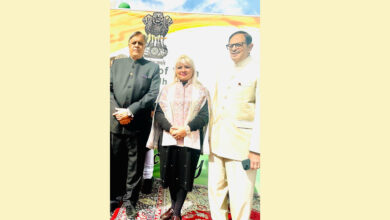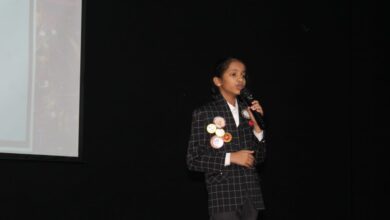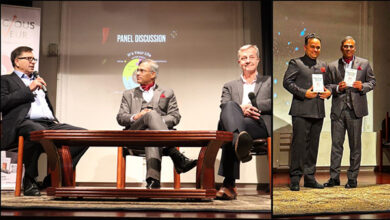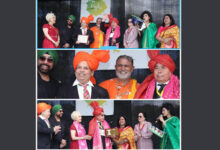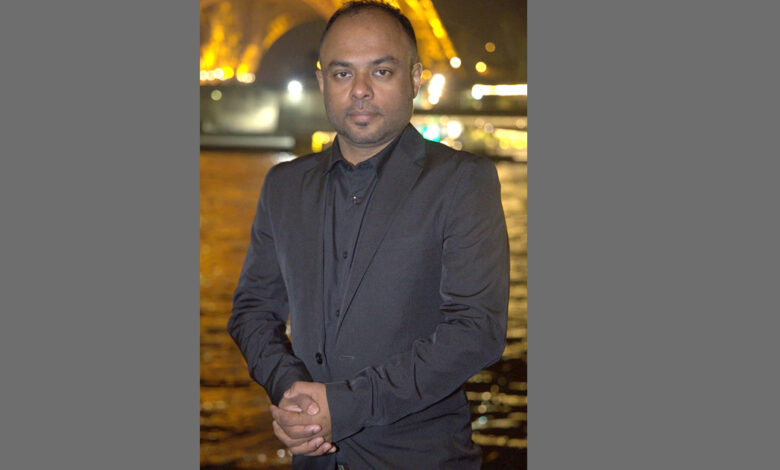
From Street Corners to Social Stardom: The Unstoppable Rise of Jiboombaa in Paris
Paris, [France], August 13, 2025: Every afternoon in La Chapelle, northern Paris, something extraordinary happens. Between the aromatic clouds of biryani and roasted peanuts, crowds gather, sometimes ten people, sometimes three hundred, drawn to a single street stall. No celebrity appears. No scheduled performance begins. Just a man in a Bond-worthy suit, slick shades, and a wireless microphone, chanting words that have become Paris’ most unlikely anthem: “Boom boom! Who wants a ji boom baa umbrella?”
Meet Jiboombaa, the Kerala-born street vendor who has rewritten the rules of viral fame. Over six months, this enigmatic figure has transformed from a humble electronics seller into one of Paris’ most recognizable cultural phenomena, proving that authentic charisma trumps corporate marketing every time.
The Art of Street Theater
Originally from Kerala, India, Jiboombaa operates like no other street vendor. While competitors shout for attention, he commands it through calculated charm and cinematic presence. Tall, sharply dressed, and perpetually cool, he turns every interaction into performance art. His pitches blend broken French with punchy Tamil and Hindi, delivered with an entertainer’s rhythm that makes selling feel like storytelling.
“He’s part salesman, part comedian, part street philosopher,” observes Camille Denis, cultural anthropologist at Université Paris Nanterre. “He embodies the future of urban subculture: fluid, multilingual, defiantly outsider.”
Watch him demo a portable juicer and you’ll witness poetry in motion—dancing, singing, even freestyle rapping while explaining features. Each sale becomes a moment, each customer leaves smiling. Clara Tisserand, a tourist from Lyon, captures the experience perfectly: “He sold me a Bluetooth speaker I didn’t need, but I walked away smiling.”
Viral Explosion and Cultural Impact
The turning point came with his theme song, a hypnotic loop of drums, quirky samples, and that unmistakable chant: “Boom Boom Jiboombaa.” What started as background music from his portable speaker exploded across TikTok and Instagram within days. DJs in Berlin and Amsterdam now drop it at desi house parties. Dancers and remixers from Germany to Goa have spawned thousands of reaction videos.
The phrase transcended entertainment to become cultural currency—a brand, lifestyle, and statement rolled into one hypnotic beat.
Symbol of Immigrant Pride
For young South Asians in France, especially those from Tamil, Malayali, and Telugu backgrounds, Jiboombaa represents a profound possibility. “He speaks like my uncle from Chennai, and people love him here,” says Ashwin, a French-born Indian college student. “That gives me hope.”
His influence ripples throughout the neighborhood. Nearby shops report increased sales. Local artists paint murals of his face. Fashion students sketch “Jiboombaa drip” designs. Indian restaurants now offer “Boom Boom Thali” themed meals.
Choosing Authenticity Over Fame
Despite approaches from music producers, documentary filmmakers, and UK clothing brands, Jiboombaa consistently chooses streets over studios. Sources suggest he’s intentionally maintaining street-level authenticity, understanding that his power comes from remaining irreplaceable where he is rather than trying to be everywhere.
“I came to Paris with nothing. I’m not chasing fame,” he revealed during a rare livestream. “If the people are happy, I am happy. If the kids laugh, that is enough.”
The Mystery Continues
His real name remains unknown. Some believe he’s an ex-performer from South Indian cinema. Others suspect he’s a marketing genius conducting social experiments. But speculation misses the point; his fans don’t care about his past.
“The mystery is part of the charm,” notes media researcher Louis Gérard. “Jiboombaa is whoever you want him to be.”
As whispers circulate about possible world tours hitting London, Berlin, and Dubai, one truth emerges: Jiboombaa isn’t just a man selling umbrellas. He’s a movement that proves sometimes the most powerful brands aren’t built in boardrooms, they’re born on street corners.


